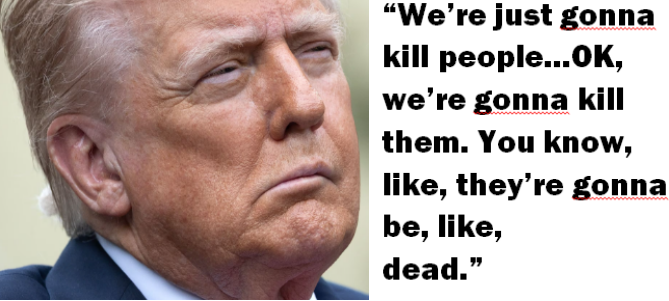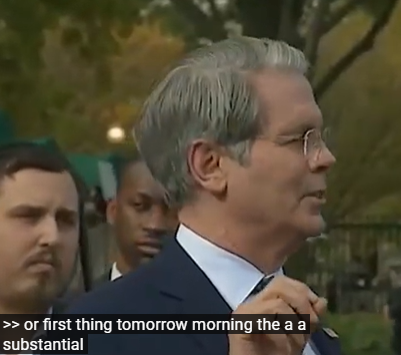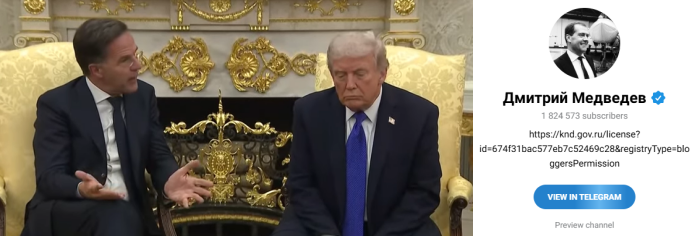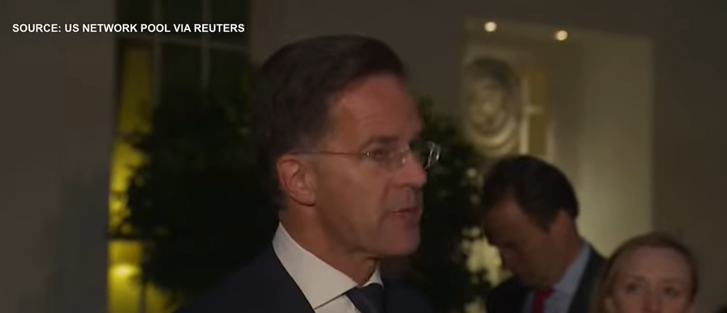 [1]
[1]
By John Helmer, Moscow
@bears_with [2]
With these new words [3] (lead image), President Donald Trump has now obliterated – his word for the US attack on Iran on June 22, 2025 [4] – whatever President Vladimir Putin and Foreign Minister Sergei Lavrov have been calling the “understandings” they negotiated at the summit meeting in Anchorage, Alaska, on August 16 [5].
Capitulate or obliterate [6]. That is, and always has been, Trump’s foreign policy for all states, but especially the states capable of defending themselves by effective force – Russia, Iran, the Democratic People’s Republic of Korea, Venezuela, Houthi Yemen, Hamas Palestine, Hezbollah Lebanon, India, China. What Trump has just said of his regime-change offensive against Venezuela applies to all. What stops such a policy is no longer words, especially not the words, “red line”. Only counterforce – and that means, to use Trump’s term, “kill them dead”.
In recent US warmaking history there is precedent. That is the body bag count which, together with the domestic inflation and unemployment rates, ended the Vietnam War – first with the words of the Paris Peace Accords of 1973 (for which Henry Kissinger received the Nobel Peace Prize), and then with the North Vietnam Army’s and Viet Cong’s force of the US rout from Saigon of 1975 (no prize for Kissinger).
For the time being, the Kremlin insists the “understandings” Putin agreed [7] with Trump in Anchorage continue in effect. “I wish to officially confirm,” declared Foreign Minister Lavrov on Tuesday (October 21), “that Russia has not altered its positions from the understandings achieved during the extensive negotiations between Vladimir Putin and Donald Trump in Alaska. These understandings are grounded in the agreements reached at the time, which President Trump succinctly summarised when he stated that what is needed is a long-term, sustainable peace – not an immediate ceasefire that would lead nowhere. We remain fully committed to this formula.”
This “formula” is also promoted by the two strongest allies of the US in the Kremlin – Kirill Dmitriev, the president’s special emissary for wealth transfer to the US; and Elvira Nabiullina, Governor of the Central Bank. In a misleading tweet, and then in anonymously leaked remarks to CNN in Miami, as he prepared to meet Steven Witkoff on October 25, Dmitriev said [8]: “[I have] arrived in the U.S. to continue the U.S.–Russia dialogue — visit planned a while ago based on an invitation from the U.S. side. Such dialogue is vital for the world and must continue with the full understanding of Russia’s position and respect for its national interests.” He told CNN he was engaged in “official talks just days after President Donald Trump announced tough new sanctions on Russia, sources with knowledge of the visit exclusively told CNN on Friday ’to continue discussions about the US-Russia relationship,’ according to the sources [9].”
“I think we are reasonably close to a diplomatic solution that can be worked out,” Dmitriev added [10] in what Tass acknowledged was his interview with CNN.
Dmitriev’s promotion of his personal role in direct negotiations with US officials has been repeatedly blocked in Riyadh and then in Anchorage by Lavrov and others.
In her policy announcement on Friday (October 24), following a 50 basis-point cut in the Central Bank’s key rate to 16.5%, Nabiullina acknowledged [11] that her policy is to cut GDP growth in Russia to zero plus statistical error. “Considering its actual dynamics, we have lowered the GDP growth forecast for 2025 to 0.5–1.0%.” What she meant by the “actual dynamics”, Nabiullina explained are the state policies for warfighting against the US and the NATO alliance on the battlefield which she opposes by calling them “pro-inflationary” and “geopolitical” risks: “Significant pro-inflationary risks have materialised since the previous meeting [September 12]. They are primarily associated with an increase in the budget deficit in 2025 and higher fuel prices…The expected increase in taxes will help bring inflation down over the medium-term horizon, but will also lead to a one-off rise in prices in the short term.”
According [11] to Nabiullina, to reduce Russia’s inflation rate, there should be an end to the war on US terms. “Risks to oil prices have increased. The global oil market has shifted to a surplus. This might have a significant impact on prices. For Russia, the situation will be additionally complicated by the sanctions. There is persisting uncertainty related to geopolitics. Everything will depend on how the situation develops.”
The domestic Russian opposition to this policy line is vocal [12] but stops short of accusing Nabiullina and Dmitriev of betraying Russian interests. “Western sanctions are nothing compared to the sanctions of the Central Bank,” State Duma Deputy Mikhail Delyagin, a former Yeltsin government economist and now Deputy Chairman of the State Duma Committee on Economic Policy, said in June [13]. Delyagin’s is the discreet manner of putting the position.
The Kremlin spokesman, Dmitry Peskov, has attempted to deny that the General Staff’s policy – the successful advance of the Russian military on the Ukraine battlefield — is the reason for the high domestic approval of the Army and the President. They are not “correlated”, Peskov said in the Tass headline [14].
“Russians’ high trust ratings for Russian President Vladimir Putin and the country’s armed forces are separate indicators that are measured separately, Presidential Spokesman Dmitry Peskov has told the media. ‘These are separate indicators that are measured independently. They are indeed very high right now,’ Peskov said [14], responding to a question about the correlation between the high trust ratings for Putin (77.8% according to VTsIOM) and the Russian Armed Forces (80%).”
Listen to the new podcast on what is about to happen led by Dimitri Lascaris on Reason2Resist [15], held in Athens on Saturday morning.
According to a version of Trump decision-making leaked to the Murdoch press [16], “unnamed officials told [Wall Street Journal] that the three options had been developed months ago in case Trump decided to take tougher action against Russia. The strongest package included broad economic measures and direct sanctions against the Russian leadership, the middle one targeted energy resources, and the softest involved more limited steps. Trump ultimately chose the middle option, which included sanctions against Rosneft, Lukoil and their subsidiaries. One official said that on Wednesday 22 October, Trump met with Treasury Secretary Scott Bessent and instructed him to prepare sanctions on Russian oil. He then asked for feedback from top advisers. Secretary of State Marco Rubio and Defence Secretary Pete Hegseth agreed with his decision.”
In this version, Trump has been persuaded by pictures which have been shown to him at his intermittent intelligence briefings. The last of these recorded on the White House calendar was on October 16 [17]; it lasted for 50 minutes. According to the story planted on the Wall Street Journal, “sources said Trump’s patience had run out over the Kremlin leader’s failure to show willingness for peace talks, while images of destruction in Ukraine from Russian attacks kept emerging…administration officials said the images irritated him.”
By the time US Treasury Secretary Scott Bessent met Trump at the White House on October 22 [17], reportedly to be told Trump’s decision to strike with the new sanctions, he wasn’t sure that the Trump decision had been decided by the officials. “Will you sanction Russia?” a reporter asked Bessent on his way out of the White House. “So, so, we, we are going to either announce after the close this afternoon, or first thing tomor- — or, fir- — uh, or first thing tomorrow morning, the, uh, a substantial, uh, pickup in Russia sanctions. And you, you’ll have to wait until you hear it.”
 [18]
[18]Source: https://www.youtube.com/watch?v=DfGdpMUDYvA [19]
In the Russian policymaking in response to Trump’s escalation of US and allied military and economic operations, Dmitriev and Nabiullina represent a column of two, not a column of five.
Their line that Trump can be trusted to implement the “understandings” of Anchorage, and that Trump’s fresh bellicosity should be disregarded, is amplified by the state propaganda platform RT [20], and by American podcasters. The latter claim that in unannounced “contact and discussions” between Trump and Putin, there is “a more benign explanation” for Trump’s policymaking and secret assurances from Trump which the warmaking lobbies in Brussels, London, Paris, and Washington are trying to neutralize [21]. (Min 15)
 [22]
[22]Left to right: Kirill Dmitriev, Steven Witkoff, and Elvira Nabiullina.
Russian military intelligence continues to confirm that the US military and CIA are fully engaged with their counterpart British and NATO agencies and the Ukrainians in every operation attacking Russian refinery and other civilian targets in Russia, as well as against Russian oil tanker movements in the Baltic, Atlantic and Mediterranean Seas. The General Staff has advised the President that “kill them dead” is Trump warmaking policy towards Russia.
A Moscow source in a position to know comments: “if I understand correctly Trump’s plan is to treat every war like it is Gaza. He is testing the same in Venezuela. So he is convinced that if Germans are allowed to kill a lot of Russians and hit a lot of Russian assets he will not own a defeat but instead a victory by killing and bombing more. That’s some plan.”
Dmitry Medvedev, the former president and currently spokesman for the Security Council, has commented [23]: “New sanctions against our country from the United States. What else? Will there be new weapons besides the notorious Tomahawks? If any of the numerous commentators still had illusions, you will receive them. The United States is our opponent, and their talkative ‘peacekeeper’ is now fully on the warpath with Russia. Yes, he is not always actively fighting on the side of Bandera Kiev, but this is now his conflict, and not the senile Biden’s! Of course, they will say that he could not have done otherwise, he was pressured in Congress, etc. This does not change the main thing: the decisions taken are an act of war against Russia. And now Trump has completely aligned himself with crazy Europe.”
Medvedev is explicitly rejecting [24] the Kremlin’s public interpretation that Trump is being deceived by the Europeans. He also reflects the General Staff and intelligence services’ belief that Trump’s words are worthless now – that arms will decide on the battlefield. “There is a clear advantage in the next movement of the Trumpian pendulum: you can hammer with a variety of weapons at all of Bandera’s nooks without regard to unnecessary negotiations. But to achieve victory exactly where this is the only possibility. On the ground, not at a desk. Destroying enemies, not making meaningless ‘deals’.”
 [25]
[25]Source: left, https://www.youtube.com/watch?v=h7BmkrzbsDo [26] ; right, https://t.me/medvedev_telegram [27]
Here are verbatim excerpts of Trump’s conversation with NATO Secretary-General, Mark Rutte, and Rutte’s summary for the press after he left the White House:
Trump with Rutte in the Oval Office, October 22 [28]:
Donald Trump: “I think something will work out. We [Trump and Putin] have a very good relationship, but that will be a big one. We canceled the meeting with President Putin. It just — it didn’t feel right to me. It didn’t feel like we were going to get to the place we have to get, so I canceled it, but we’ll do it in the future…
Question: Mr. President, can you tell us a little bit about why you’re elevating sanctions against Russia right now? What’s the –
Donald Trump: I just felt it was time. We’ve waited a long time. I thought that we’d go long before the Middle East. And Mark, as you know, we did the Middle East plus seven. So we did seven different wars from — from Pakistan and India to so many — Azerbaijan, Armenia, Africa… Which was — which they said was impossible to do. All these wars I did. And the one that we have left, we have one left. It’ll be nine and we have one left and I think we’ll get that done too. I think we’re on our way to getting it done.”
Question: What about Tomahawk missiles. Putin is definitely afraid —
Donald Trump: Well, the problem with the Tomahawk that a lot of people don’t know, it’ll take a minimum of six months, usually a year to learn how to use them. They’re highly complex. So the only way a Tomahawk is going to be shot is if we shot it, and we’re not going to do that. But there is a tremendous learning curve with the Tomahawk. It’s a — it’s a very powerful weapon, very accurate weapon and maybe that’s what makes it so complex. But it will take a year. It takes a year of intense training to learn how to use it and we know how to use it. And we’re not going to be teaching other people. It will be — it’s too far out into the future.
Question: I saw, Mr. President, that you said as recently as yesterday, that you still believe that Putin wants to end the war.
Donald Trump: Yeah, I do.
And then today, you took this step to [Inaudible] the sanctions and put more pressure on them.
Donald Trump: Yep.
Question: What else are you going to do to encourage him to get there or can you explain why you do believe he wants peace?
Donald Trump: Yeah, it’s a good question. Today is a very big day in terms of what we’re doing. Look, these are tremendous sanctions. These are very big. Those are against their two big oil companies and we hope that they won’t be on for long. We hope that the war will be settled. We just answered having to do with the various forms of missiles and everything else that we’re looking at, but we don’t think that’s going to be necessary.”
Question: Mr. President, can you convince President Xi to stop purchasing all that Russian oil that’s funding this war against Ukraine?
Donald Trump: Well, I think I’ll be talking to him about it. I think it’s a little bit of a different talk. India, as you know, has told me they are — stop. You know, they’re — it’s a process, you can’t just stop it, but by the end of the year they’ll be down to almost nothing. That’s a big thing. That was almost 40 percent of the oil. India, they’ve been great. Spoke to Prime Minister Modi yesterday. They’ve been absolutely great. China is a little bit different. You know, they’re a little bit different relationship they have with Russia. It was never good, but because of Biden and Obama, they got forced together. They should never have been forced together. But they’re a little bit forced, but they’re — by — by nature, they’re not — they can’t be friendly. They can’t be. By nature, they can’t. I hope they are friendly, frankly, but they can’t be. The — you don’t want — you should not have forced Russia and China together and Biden did that and Obama did that. They forced them together because of energy, because of oil. And so they are closer than they would normally be. I think I’ll probably be talking about it. What I’ll really be talking to them about is how do we end the war with Russia and Ukraine, whether it’s through oil or energy or anything else. And I think he’s going to be very receptive. He — he would now like to — I don’t — I’m not sure that he did at the beginning. He would now like to see that war end.
Question: [Inaudible] Mr. President, do you think Xi plays an important role in terms of inserting himself and convincing Putin who he speaks to regularly stop the war right now —
Donald Trump: Yeah, I do. I think he can have a big influence on Putin. I think he can have a big influence on a lot of people. Look, he’s a respected man. He’s a very strong leader of a very big country. Yeah, I think he can have a big influence and we will certainly be talking about Russia, Ukraine. In the back.”
Rutte leaving the White House, October 22, follow-up press remarks: [29]
 [30]
[30]Source: https://www.youtube.com/watch?v=xaWy1vUPhIg [31]
“When you look at the Russian side, they started this war, clearly is not moving in the right direction. And when you look at this year, let’s say the territory they gained in Ukraine is extremely limited. And as I said, against enormous amount of people dying and getting seriously wounded. The Russian economy is in difficult situation. We know we have these long lines into gasoline stations all over Russia at the moment. We know that the French president and others in Europe stepped up when it comes to the shadow fleet. And, of course, we have seen the pressure by the American president on some European countries to stop buying oil. So all of this is having an impact.
So I’m absolutely convinced that with sustained pressure, we will be able to get Putin to the table to agree with a ceasefire and then other talks coming after that. And you have seen it in the last couple of weeks, Alaska happened when the American President decided to do secondary sanctions on India buying Russian oil.
We have seen last week the call taking place when the President said, ‘I’m contemplating sending Tomahawks into Ukraine for Ukraine to be used.’ So this is clear evidence that we can change Putin’s calculus. Yes.”
Question: Are you not concerned that every time Vladimir Putin speaks to President Trump, President Trump appears then to go to his position, that there is flip-flopping by the US President and that we could be talking in a week from now and things will have gone back, he’ll have gone back to the Russian camp?
Mark Rutte: Well, I don’t buy that and I don’t agree with that. Because here’s the case. You guys live in the most powerful country in the world, but most powerful military. You have a President who, when I visited him first in Mar-a-Lago last year, November when he still had to be inaugurated, but after he won the election, said, ‘Mark, I want the killing to end. I want the meat grinder to stop. I want no more people lost.’ This is extremely close to his heart. And then, given his powerful position and his vision on this, he’s the only one who can sit down with Putin and get him to change this calculus and give him a bit of bandwidth to do that. I mean, that is in his remit and he is doing it in a way I completely support.”